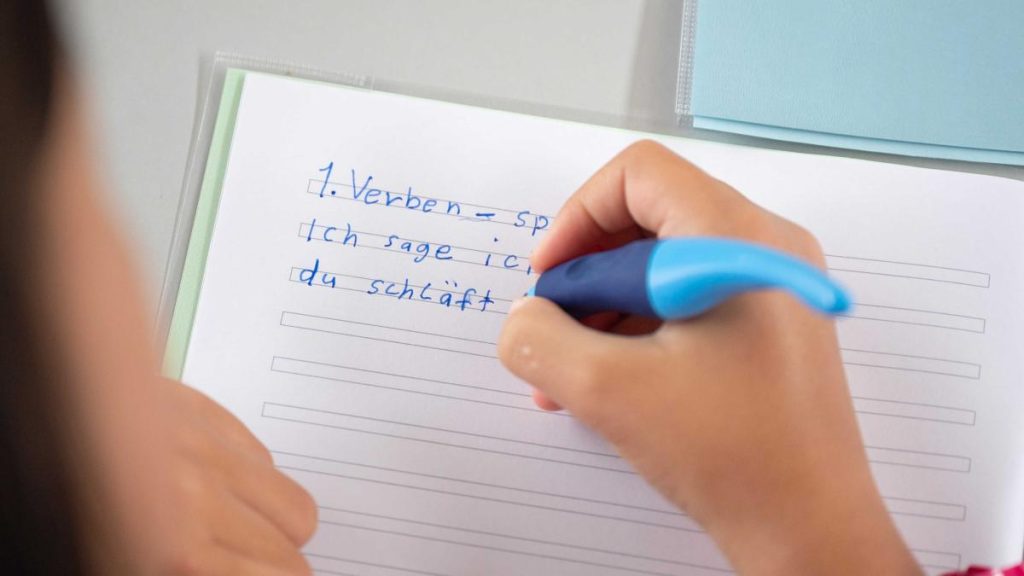In the German language lessons in Schleswig-Holstein, starting from the upcoming school year, the number of spelling errors will no longer be crucial for students. The so-called error quotient for assessing spelling competencies will be eliminated by the 2024/2025 school year. “Regardless, the assessment of spelling and punctuation will remain an important part of the grade,” said Education Minister Karin Prien (CDU) on Tuesday. “The imparting of spelling and punctuation competency will continue to be central.” Previously, students would, for example, only receive a grade 2 if they made one spelling mistake in 149 words. If there was one error in 99 words, they would only receive a grade 3.
“Differentiated feedback” instead of just counting errors “From a didactic perspective, the elimination of the outdated error quotient is quite sensible because students will receive qualitative feedback on error patterns and the systematic nature of their mistakes in the future,” said Prien. In addition, teachers could more fairly assess spelling competencies. At this point you will find third-party content In order to display embedded content, your revocable consent is required for the transmission and processing of personal data, as third-party content providers ask for this consent [In this context, usage profiles (e.g. based on cookie IDs) may be created and enriched, even outside the EEA]. By setting the switch to “on”, you agree to this (revocable at any time). This also includes your consent to the transfer of certain personal data to third countries, including the USA, in accordance with Art. 49 (1) (a) GDPR. More information can be found . You can revoke your consent at any time using the switch and via privacy settings at the bottom of the page. “The basis is a differentiated analysis sheet that the ministry is currently developing and will make available to teachers for the new school year. So: Differentiated feedback to students instead of just counting errors.” According to the Ministry of Education, besides Hessen, Schleswig-Holstein is currently the only federal state that still uses an error quotient to assess spelling competencies. This is due to a nationwide standardization of examination conditions.
The decision to eliminate the error quotient has been met with support by many in the education sector in Schleswig-Holstein. This change is seen as a positive step towards providing students with more meaningful feedback on their spelling abilities. By focusing on providing detailed feedback on specific areas of improvement, teachers will be able to better support students in developing their spelling and punctuation skills. The new approach aims to shift the focus from simply counting mistakes to identifying patterns and systemic errors in students’ writing. It is hoped that this change will lead to a more accurate assessment of students’ spelling competencies and a more targeted approach to addressing individual learning needs.
In addition to the removal of the error quotient, the Ministry of Education in Schleswig-Holstein is also working on developing a differentiated analysis sheet that will be available to teachers for the new school year. This tool will enable teachers to provide students with detailed feedback on their spelling and punctuation errors, helping them to understand their mistakes and improve their skills. By offering personalized feedback, teachers can tailor their support to each student’s specific needs, ultimately enhancing the learning experience and promoting growth in spelling competencies. The introduction of this new system reflects a modern approach to language education that emphasizes individualized learning and targeted support for students.
Overall, the elimination of the error quotient in assessing spelling competencies in German language classes in Schleswig-Holstein marks a significant change in the approach to evaluating students’ writing skills. By focusing on providing students with qualitative feedback and analyzing their errors in a systematic way, teachers aim to offer more meaningful support for students in developing their spelling and punctuation abilities. This shift towards a more personalized and targeted assessment of spelling competencies is expected to enhance the learning experience and promote growth in students’ language skills. As Schleswig-Holstein adopts this modern approach to language education, it sets a precedent for other regions to consider alternative methods of assessing students’ writing abilities.


